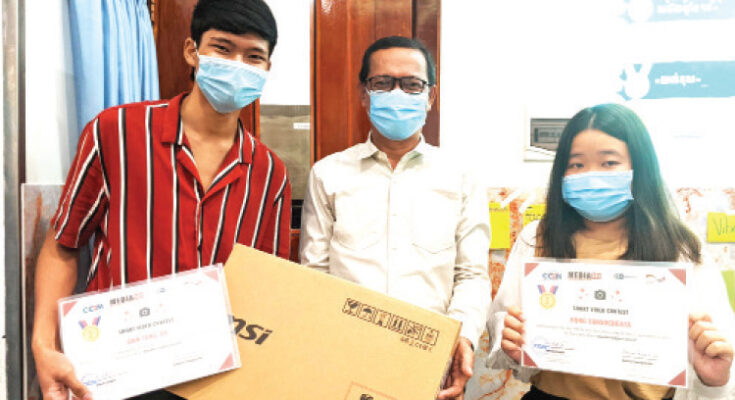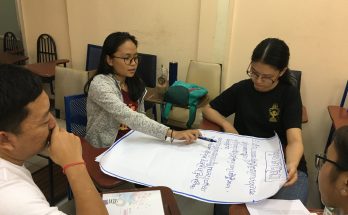This article is written by Scarlett Green and originally published on Khmer Times.
To get Cambodian youths to spot real and fake news on COVID-19, Cambodian Center for Independent Media (CCIM) had posted a short video contest themed “The challenges youths are facing on social media during COVID-19” on the digital media platforms last year.
The contest received a very encouraging response from youths with 106 individuals or teams sending in 38 videos out of which 14 were shortlisted.
The winning video, jointly produced by Hung Sansocheata and Orn Tong An and entitled “Doubled edged sword”, garnered 982 likes, 474 shares, and 8.7k views. They received a laptop and a certificate.
The videos portrayed how people came across a lot of fake news on how to prevent COVID-19 by eating charcoal, ground garlic, chili, and boiled eggs and even making scarecrows to keep the virus away.
It also showed how youths and people got easily fooled with all these many fake news and shared the postings with others on social media including friends and family members with many believing them.
Hung Sansocheata and Tong An said the contest was timely with so much news about COVID-19, especially on social media where people are confused on whether they are real news or fake news.
“I think that this is a very important topic for all the youths in Cambodia, including me. I am glad I got the chance to voice out my opinion through this video as there are lots of fake news circulating on social media since the pandemic,” said Sansocheata.
“It was challenging for us, as we are not very good at editing and making videos. The aim of our video was to get people to check the correct source of news and not blindly share it with others. Many people including teenagers do not have clarity between the fake and real news,” said Tong An.
He said with the education system affected by the COVID-19, they felt that they need to motivate and encourage students to use the digital platform to gain information to enhance their knowledge.
With Media and Information Literacy (MIL) being used extensively by youths to acquire knowledge and information, CCIM felt that posting the video contest would reach wider audience participation.
CCIM got funding from DW Akademie, International Media Development based in Bonn, Germany for the contest.
The CCIM believes in “Everybody well informed, everybody empowered” and works collaboratively with partner universities – Pannasastra University of Cambodia (PUC) and University of Puthisastra (UP) – to set up the “Media 101” MIL Clubs and MIL Forums in Phnom Penh and other provinces. Their main aim is to develop youths’ critical thinking skills and their media and MIL.
“The video storytelling session is a key component of the MIL training curriculum. After the video session, students are able to produce videos that are relevant to their life. Therefore, the short video contest is our main project activity,” said Vibol Mam, Project Coordinator at CCIM.
He pointed out that youngsters expose themselves to information disorder (disinformation), online harassment (cyberbully, sexting, hate speech), and other forms of digital security.
With the rapid growth of technology, he said, youths normally are seen to be very active on social media with only a few spending their free time on online entertainment and many tend to share their postings, irrespective of whether they are real or fake news.
“Youths express their opinions on social media since they believe that the platforms can reach many people and diverse audiences. They hope this will help solve their problems and concerns. However, they are sometimes unaware that expressing their concerns in social media can negatively affect them if they don’t use these platforms responsibly. This is where MIL comes in,” added Vibol.
Ministry of Information spokesman Meas Sophorn said: “Disinformation can harm the individuals, communities and the whole national societies and violate the laws, so fighting them is the duty of the government, the ministries and institutions, all relevant development partners and stakeholders and media entities,” he added.
He said the media plays a pivotal role in releasing the true information on COVID-19 to the public and hoped it will continue to fight the fake news.
He also called on the social media platform users to be responsible and respect the rights of others and the law.



